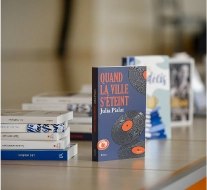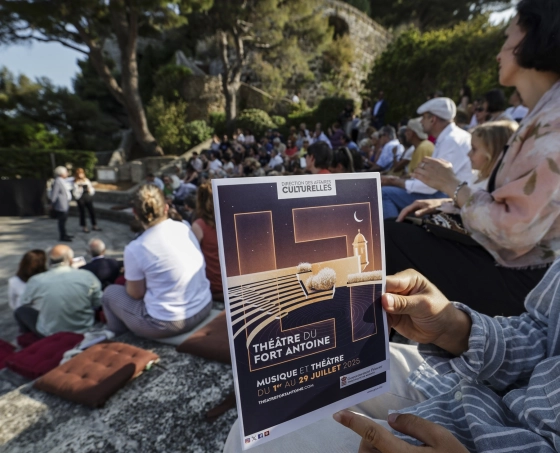

Introduction
Some prominent French literary figures have links of one kind or another with the Principality
From Marcel Pagnol to Léo Ferré, from Armand Lunel to Guillaume Apollinaire, Monaco has played a role in the lives of a number of authors. Literature is also celebrated in the Principality through the Prince Pierre Foundation which presents several awards annually to French-speaking authors, the Pen Club of Monaco, which presents an award and runs a literary competition, and the annual Monaco Book Fair.
Literary prizes
Since 1951, the Prince Pierre of Monaco Foundation has recognised authors by annually awarding three literary prizes:
- The Literary Prize: based on the recommendation of the Literature Council, this honours a well-known writer in the French language for their entire body of work
- The Discovery Grant: this grant rewards a French-speaking author in the French language for a debut work of fiction
- The High School Pupils’ Favourite Choice: this prize is awarded by a jury of secondary school pupils in the Principality, who make their decision from a shortlist of first novels drawn up at the start of the literary season in September. This is a truly educational project, set up in cooperation with the Department of Education, Youth and Sport, which aims to increase pupils’ awareness of contemporary literature and the world of publishing
The Pen Club of Monaco awards two prizes every year:
- The 1,000 Words Prize is a writing competition open to upper secondary school pupils in the Principality, who must answer one of two questions in 1,000 words
- The Armand Lunel Prize is an international fiction competition. It aims to give those who wish to take part an opportunity to showcase their talent as a writer by producing a novel
Monaco Book Fair
Organised by "Les Rencontres Littéraires Fabian Boisson" and under the high patronage of H.S.H. Prince Albert II, Monaco Book Fair is an unmissable event for literature enthusiasts. Since 2012, this annual event, held over a weekend, has offered talks and opportunities to meet major contemporary authors.
The Monegasque language
Alongside the events showcasing literature in the Principality, great Monegasque poets have worked hard to protect the local language and make it a language of choice within the Principality’s literary heritage. An exceptional linguistic feat if one considers that Monegasque was used only as a spoken language just 200 years ago. Now standardised and taught, it is even used in the translation of certain major and well-known works.
It was the poet and writer Louis Notari (1879–1961) who returned the Monegasque language to centre stage. A passionate advocate of the dialect, he was the first to standardise Monegasque as a written language, where previously it had only been used in spoken form. It was from his pen that flowed the very first work entirely written in the Monegasque language: The Legend of Saint Devota. Notari also authored the words of the Monegasque national anthem, which had originally been written in French by Théophile Bellando de Castro.
Louis Notari is also widely known for having written the words to Campanin de San Niculau, a piece which was actually performed at the funeral of Prince Rainier III, in accordance with his wishes. In recognition of his legacy, a street and a library in Monaco now bear Louis Notari’s name.
The Monegasque priest and poet Louis Frolla also helped to standardise the language by publishing a Monegasque grammar in 1960 and then a French–Monegasque dictionary in 1963. Twenty years later, this was supplemented by another dictionary co-authored by the Monegasque lexicographers Louis Barral and Suzanne Simone.
There is also the Monegasque priest Georges Franzi, considered to be the first teacher of the Monegasque language in the Principality after Prince Rainier made learning the language compulsory in schools in 1972.
Today, all lower secondary school pupils must study the Monegasque language. The Academy of Dialect Languages, established in 1981, helps to promote the language by offering courses and representing the Principality at international linguistic symposia and conferences.
Monaco’s story is also told through comics
Fans of comic books will be delighted to learn that there are around ten comics, which can be viewed at the Monaco Multimedia Library, and which recount the Principality’s history and tell the story of its most iconic historical figures. What is more, some include prefaces written by Prince Rainier III or Prince Albert II, demonstrating their support for these wonderful initiatives.
The most recent issue to date is dedicated to the legend of St. Devota, the patron saint of Monaco. Another, dedicated to Prince Albert I and his incredible expeditions, was published in 2018.
Online content

Conférence - Leïla Slimani "Écrire : Apprivoiser l'obscurité"

Conférence de Georges Vigarello "Le sport dans l'art"

Podcast - Charlotte Casiraghi
News posts

La nouvelle saison du Théâtre du Fort Antoine dévoilée

Ateliers d’artistes à Monaco - Appel à candidatures
